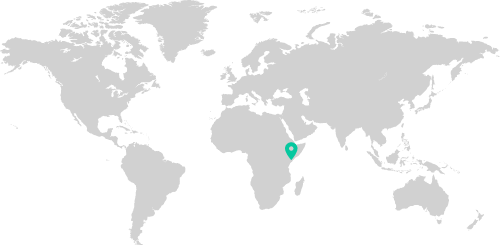Mercy corps/ Safaricom- Digitization for upliftment of small farmers from the trenches of poverty
The backbone of the Kenyan economy is agriculture, which employs 75% of its workforce. Small farmers, as in most agro-economies, account for the majority. And as with most cases, most small farmers are entrenched in poverty. With a mission to increase agricultural productivity, food security, and farmers' incomes, Mercy Corp, an International Developmental Non-Governmental Organization, along with Safaricom, a mobile service provider, partnered with Cropin for the project in ESA, Kenya. Digital inclusion, which is vital to empower marginalized farmers in their fight against poverty, was the chosen path.
The project aimed to alleviate enduring poverty among smallholder farmers by developing economic resilience in them and their communities through improvement in crop productivity. This project started in 2020, has impacted 2,50,000 farmers, and is completed now. More than 3,600 Digital Village Advisors (DVAs) were trained to use digital applications. Farmers were registered, and plots were geo-tagged. A data bank was created that provided value-added services, including access to inputs, finance, and market linkages.
The Herculean challenge
The project aimed to increase farmers' income, which is often impacted by weather-based vulnerabilities. Data was collected manually and therefore were labor-intensive and prone to errors, leading to time and effort spent on reconciliation and reviews. Another challenge was the inaccurate mapping of plots and poor understanding of geographical spread. There was zero transparency on the activities of DVAs and the result of interventions from their end.
To improve productivity, farmers required a package of practices (PoPs) ideal for the crop under cultivation, but they also lacked on this front. Mercy Corp's other challenges were - the inability to share weather advisory, inconsistent yield insights and lack of proper crop health monitoring information. Insights from smallholder farmers showed that the core of their issues were low-quality inputs, unstable markets, lack of finance, and the absence of information on good farm practices.
Spinning the magical power of technology
Agriculture is mostly the only source of income for the farmers in this region. Mercy Corp/Safaricom, through the project, wanted to take a human-centered approach to impact smallholder farmers positively. To address this, Mercy Corp/Safaricom planned to tap technology popular with tomorrow makers – the youth to drive transformations. The use of Agtech to digitize agricultural practices, adapt them to the local context, provide farmer advisories, and train and knowledge management was adopted as the way forward by the alliance. This was aimed at enhancing productivity resulting in improved income for smallholder farmers.
Mercy Corp/Safaricom partnered with Cropin to develop a platform that facilitated two-way communications with the farmers and paved the way for farmer engagement (via SMS etc.). The project aimed to provide farmers with end-to-end services, including market linkages. This was achieved by secured digitization of farmers' data and building digital profiles through an extension team. The project's objective was to collate socio-economic details, farm details and document information on crops grown, etc.
Digitizing farms and farmers' data, which is the key to this project, was successfully completed by Cropin. Farmland spanning 9,28,940 acres was digitized for various crops, and extensive geotagging of plots was completed. The use of the platform also enabled tracking activities of DVAs, which led to transparency. It shared update alerts on product features with farmers and the product user manual with the field officers.
Cropin platform enabled tracking application of agri-inputs for compliance, which ironed out the issue of low-quality inputs. Further, with support from Cropin, Mercy Corp/Safaricom strengthened farmers by offering:
- standard PoP to be followed with timelines,
- automated climate-smart advisories to encourage climate-smart agriculture,
- crop health monitoring assisted pest and disease alerts to help nip the issue in the bud.
Now that all these were put in place, an accurate yield estimation was done by Cropin using advanced Agtech products. Cropin helped Mercy Corp/Safaricom with Crop Health Monitoring and collecting existing vegetation and sowing window data.
It disseminated knowledge to the field team to provide farmer advisory and training on best practices during the hand-holding process. To ensure product adoption, Cropin monitored data collection activities to check activation.
The process streamlined communication with farmers and enabled engagement. The cream on the pie was the adaptability to the local context and support in the local language for farmer Advisory and Field User and Web app.
The high impact
The use of Cropin solutions empowered Mercy Corp to:
- Monitor and manage 97,239 plots across Kenya
- Audit more than 9,28,940 acres of farmland across multiple crops like Beans, Broccoli, Peas, Soybean, Green gram, Sunflower, Sorghum, and Maize
- Help more than 3,600 DVA to use SmartFarm mobile applications for farmer registration, plot registration, and geo-tagging the cultivated land
- Digitally capture and incorporate above 100,000 farmers' data into the system by DVAs.
Cropin enabled data organization and management on the platform, resulting in easy access to information. The project works to improve smallholder farmers' production, economic and social well-being, and enable viable livelihoods. In this context, long-term financing will support these farmers and have tangible, positive socio-economic outcomes. Data moat is being created to enable informed decision-making by financial institutions and insurers and give small holding farmers access to inputs and market linkages.
The project touched the lives of 1.4 million farmers in 2021.



